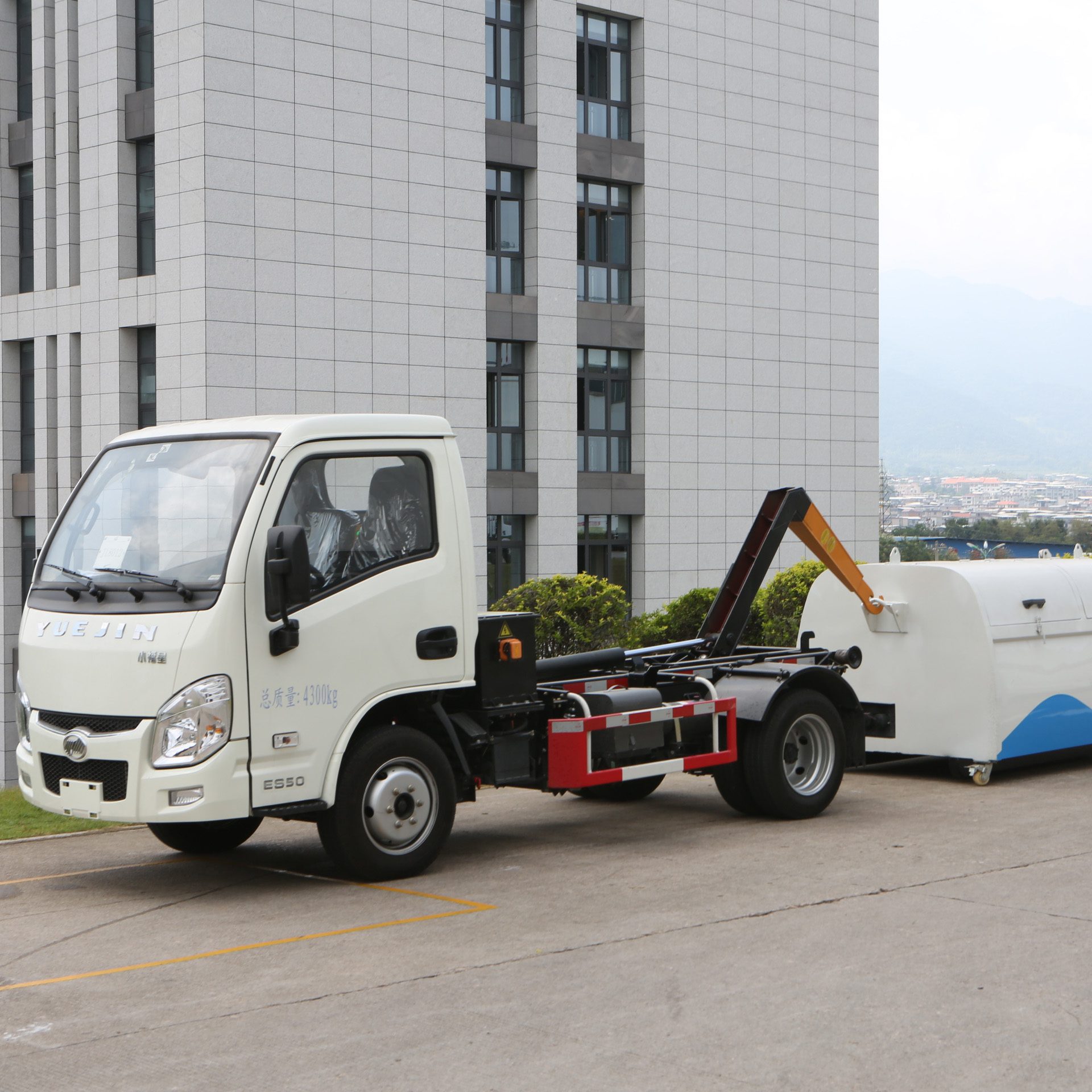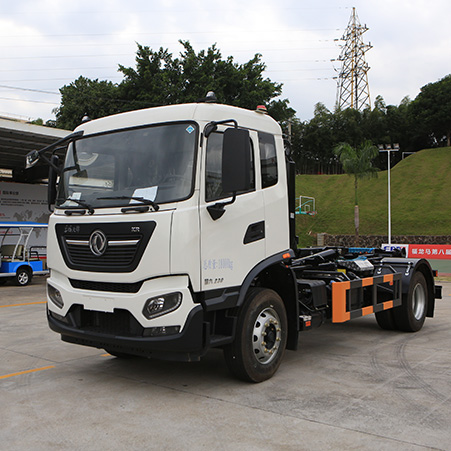When it comes to managing waste, hauling materials, or transporting equipment, choosing the right truck for the job is crucial. Two of the most popular options for businesses in these industries are hook lift trucks and roll-off trucks. Both are designed to carry large, heavy containers, but they do so in different ways, each offering unique advantages.
Whether you’re in the construction, demolition, or waste management industries—or any field that involves transporting heavy loads—understanding the differences between these two trucks will help you optimize your operations.

What Are Hook Lift Trucks?
A hook lift truck is a versatile vehicle designed for lifting and transporting containers of varying sizes and weights. The system operates using a hydraulic hook mechanism attached to the rear of the truck. The hook lifts the container, locks it into place, and secures it for transport. Hook lift trucks are ideal for businesses that need to transport different types of loads, as the containers can be easily swapped without the need for a crane or additional equipment.
Key features of hook lift trucks:
- Versatility: They can transport containers of various sizes and types, including dumpsters, storage units, and flatbeds.
- Efficiency: The hook lift system allows operators to load and unload containers quickly, saving time and labor costs.
- Compact design: Hook lift trucks can often maneuver in tighter spaces than roll-off trucks due to their more compact structure.
What Are Roll-Off Trucks?
A roll-off truck is designed to transport large, open-top containers—often called roll-off dumpsters—that are rolled off and rolled onto the back of the truck. Roll-off trucks are widely used in the waste management, construction, and demolition industries for moving bulk waste or heavy materials. The process involves lowering the truck’s hydraulically operated platform, allowing the container to roll off when the truck reverses. When it’s time to collect the load, the truck’s platform lifts the container back onto the bed, securing it for transport.
Key features of roll-off trucks:
- Simple loading and unloading: The roll-off mechanism is straightforward and can be done by a single operator with little effort.
- Heavy-duty capacity: Roll-off trucks typically carry larger loads, often used for bulk waste or construction debris.
- Common use: They are especially popular in waste removal and construction operations due to their heavy load capacity.
Key Differences Between Hook Lift Trucks and Roll-Off Trucks
Now that we know what each type of truck does, let’s take a closer look at the key differences between hook-lift trucks and roll-off trucks. Understanding these distinctions will help you make a choice based on the specific needs of your business.
1. Container Flexibility
- Hook Lift Trucks: One of the primary advantages of hook lift trucks is their container flexibility. Hook lift trucks can carry various types and sizes of containers, making them ideal for businesses that require versatility. From dumpsters to flatbeds and even specialized containers, the hook lift system can handle it all.
- Roll-Off Trucks: Roll-off trucks are generally designed for one specific type of container: the roll-off dumpster. This can limit their versatility, especially for businesses that need to transport different types of goods or waste. However, roll-off dumpsters come in different sizes, so you still have some flexibility, just not to the same extent as with hook lift trucks.
2. Loading and Unloading Speed
- Hook Lift Trucks: These trucks excel in speed and efficiency when it comes to loading and unloading containers. The hook mechanism allows operators to quickly swap out containers, enabling faster turnarounds and reducing downtime between jobs.
- Roll-Off Trucks: While roll-off trucks are still efficient, the loading and unloading process is usually slower. The container needs to be rolled off the truck, which can take a little more time and effort compared to the hook lift’s quick system.
3. Maneuverability
- Hook Lift Trucks: Hook lift trucks are often more maneuverable than roll-off trucks. Their compact size allows them to navigate tighter spaces, making them suitable for urban areas or construction sites with limited room for maneuvering.
- Roll-Off Trucks: Roll-off trucks tend to be larger and bulkier, making them less nimble in tight spaces. They require more room to unload and typically need a wide turning radius. This can be a disadvantage in urban environments or smaller job sites.
4. Load Capacity
- Hook Lift Trucks: Hook lift trucks can carry heavy loads, but they are generally designed to handle lighter to medium-weight containers. While they can still transport large volumes of waste or materials, they may not be the best option for extremely heavy or bulky loads.
- Roll-Off Trucks: Roll-off trucks typically have a higher load capacity, especially when it comes to handling large amounts of waste or construction debris. They are ideal for heavy-duty tasks where high-capacity containers are required.
5. Cost and Maintenance
- Hook Lift Trucks: Due to their versatility and the complexity of the hook lift system, these trucks can be more expensive upfront. Maintenance costs may also be higher, as the hook lift system involves hydraulic components that require regular servicing to keep everything running smoothly.
- Roll-Off Trucks: Roll-off trucks tend to be less expensive than hook lift trucks, making them a more budget-friendly option for businesses with limited capital. Additionally, the maintenance costs for roll-off trucks are usually lower since the system is simpler and involves fewer components.
Which Truck is Best for Your Business?
Choosing between a hook lift truck and a roll-off truck depends largely on the specific needs of your business. Below are a few scenarios to help guide your decision:
Choose a Hook Lift Truck if:
- You need flexibility: If your business requires transporting different types of containers or goods—such as flatbeds, dumpsters, or specialty containers—a hook lift truck’s versatility makes it the ideal choice.
- You need speed and efficiency: Hook lift trucks excel in quick loading and unloading, allowing you to complete more jobs in less time.
- You have limited space: If your operations are conducted in tight spaces, the compact design of hook lift trucks can make maneuvering much easier.
Choose a Roll-Off Truck if:
- You work with heavy-duty waste or materials: If your primary goal is transporting large amounts of construction debris, demolition waste, or bulky materials, a roll-off truck will be your best bet.
- You need to transport large containers: Roll-off trucks are designed to handle large, heavy containers, so they are the go-to choice for businesses that frequently require high-capacity load-hauling.
- You have a tight budget: Roll-off trucks are generally more affordable both in terms of purchase price and maintenance, making them a better fit for businesses with financial constraints.
Conclusion
Both hook lift trucks and roll-off trucks have their unique advantages, and the right choice ultimately depends on the specific needs of your business. If you require flexibility, speed, and maneuverability, a hook lift truck may be the better option. On the other hand, if you need to transport heavy loads or large waste containers, a roll-off truck might be the more appropriate choice.
In the end, the decision should be based on factors like the type of work you do, the volume of waste or materials you need to transport, your available budget, and the level of versatility required for your operations. With the right truck in your fleet, you’ll be well-equipped to handle the demands of your business, ensuring efficiency, cost-effectiveness, and smooth operations.









